Day 4 key takeaways from Trump's 2nd impeachment trial: Trump lawyers make defense of former president
Trump's defense team used just 2 1/2 hours of their allotted 16 hours.
Donald Trump's lawyers took to the Senate floor Friday for just under three hours, and aggressively argued that Democrats lacked evidence to link the former president to inciting the Jan. 6 riot on the Capitol -- instead claiming that his comments that day were protected free speech and that Democrats were motivated by their hatred of Trump.
Their presentation -- which made no mention of some of Trump's own comments about the riot and his extensive campaign to sow doubt in the election and overturn the results -- relied heavily on out-of-context videos of Democrats saying the word "fight" over ominous music, in an effort to equivocate between his comments ahead of the storming of the Capitol and Democrats' own language.
Their abbreviated arguments were a sharp contrast to the meticulous, multiday presentation from Democrats, but the proceedings provided no new indications that 17 Republicans will vote to convict Trump.
A final vote could come as early as Saturday, when the Senate is scheduled to reconvene at 10 a.m.
Here are six key takeaways from Day Four:
Defense tries to downplay Trump's rhetoric
Trump's attorneys, David Schoen, Bruce Castor and Michael van der Veen, sought to recast Trump's language and tone around the Jan. 6 riot on Friday, laying out an alternative timeline surrounding the attack that distanced Trump from the mob at the Capitol.
Castor, who was panned for his performance at the start of the trial, argued that the riot was preplanned and that Trump "was immediate in his calls for calm," ignoring Trump's tweet attacking then-Vice President Mike Pence, the hours of silence from the White House and Trump's video message to the rioters, when he said, "Go home. We love you."
While Democrats pointed to Trump's own words to claim that he spent months riling up supporters to challenge the election results, and teased a confrontation on Jan. 6 when Congress certified the results, Trump's lawyers instead falsely denied that he had ever glorified violence.
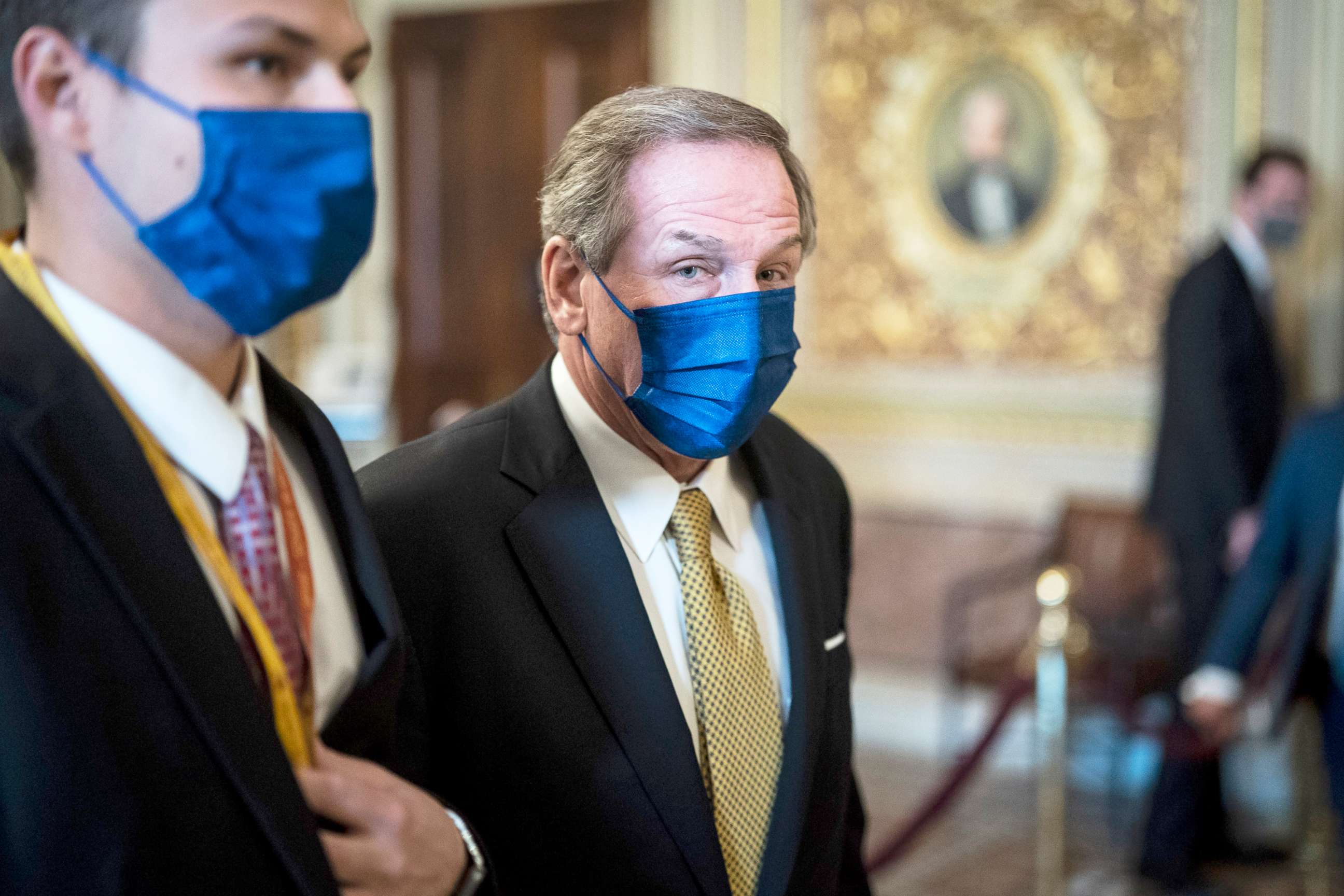
They also sought to downplay Trump's phone call with the Georgia secretary of state in January, when he urged Republican Brad Raffensperger to "find" enough votes to flip the state's results.
"It is clear that President Trump's comments and the use of the word 'find' were solely related to his concerns with the inexplicable, dramatic drop in Georgia's ballot rejection rates," Castor said, after initially mixing up Raffensperger's last name and Ben Roethlisberger's, the Pittsburgh Steelers quarterback.
The call is now under investigation in Georgia.
"This unprecedented effort is not about Democrats opposing political violence. It is about Democrats trying to disqualify their political opposition. It is Constitutional cancel culture," van der Veen said.
The defense, and the combative nature of Trump's lawyers, led to heightened tensions on Friday.
"How gullible do you think we are?" Rep. Jamie Raskin, D-Md., the lead impeachment manager, angrily said Friday, arguing that Trump was "reveling" in clashes between his supporters and protesters at his campaign rallies.
Many questions, few answers
Senators lobbed 24 questions at managers and Trump's defense team -- and received far fewer answers.
Trump's lawyers were pressed by several key Republicans about what Trump knew about the attack on the Capitol and when, and what he did to stop it.
Van der Veen deflected those questions and suggested he didn't know the answers -- information possessed by his client -- and instead attacked Democrats for failing to conduct a comprehensive investigation into the attack in the House before they impeached Trump.
"The House managers have given us absolutely no evidence one way or the other on this question," he said.
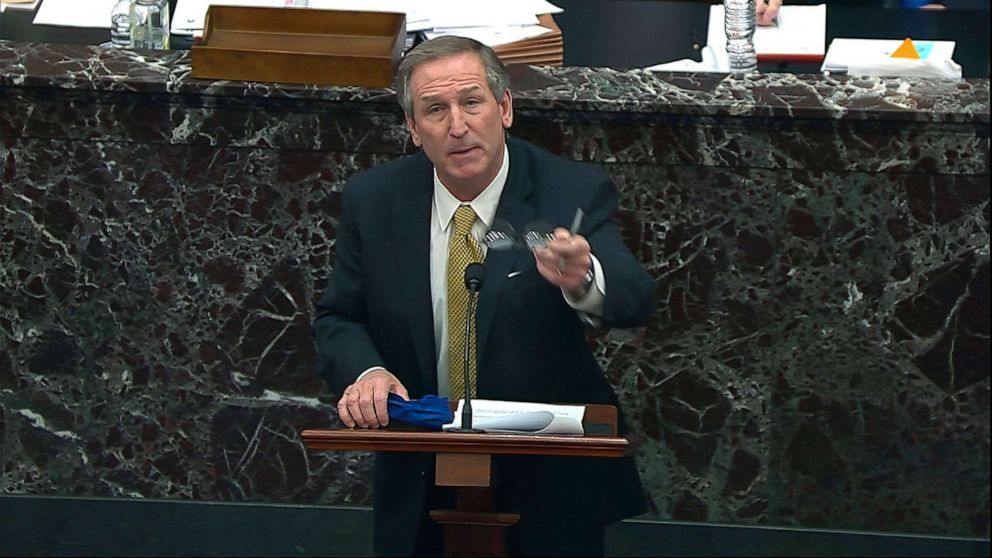
Sen. Susan Collins, R-Maine, who asked about Trump's actions to end the riot and requested that his lawyers "be as detailed as possible," told reporters that she was left unsatisfied by the answer.
"I didn't really feel that I got a response, but I'm not sure that that was the fault of the counsel," she said. "One of the problems is with the House not having hearings to establish exactly what happened when, it's difficult to answer a question like that."
Democrats have argued that a prolonged investigation was unnecessary given how recently the riot unfolded and the extensive work from law enforcement to track down and prosecute the rioters. They also wanted to move quickly to convict Trump because they argued that he represented an immediate threat to democracy in his final days in office.
Cassidy notes caught on camera
Sen. Bill Cassidy, R-La., has signaled a willingness to consider convicting Trump, after surprising Republicans in Louisiana and the Senate by supporting the constitutionality of the trial this week.
A Washington Post photographer spotted the Republican, one of several who could side with Democrats at the conclusion of the trial, reading notes that said the House team "did not connect the dots to show President Trump knew that the attack on the Capitol was going to be violent and result in the loss of life," suggesting he is leaning toward acquittal.
Asked about the draft statement, Cassidy told The Washington Post that the packet he was seen reviewing also included a statement "going the other way," and maintained that he hasn't decided how he will vote.
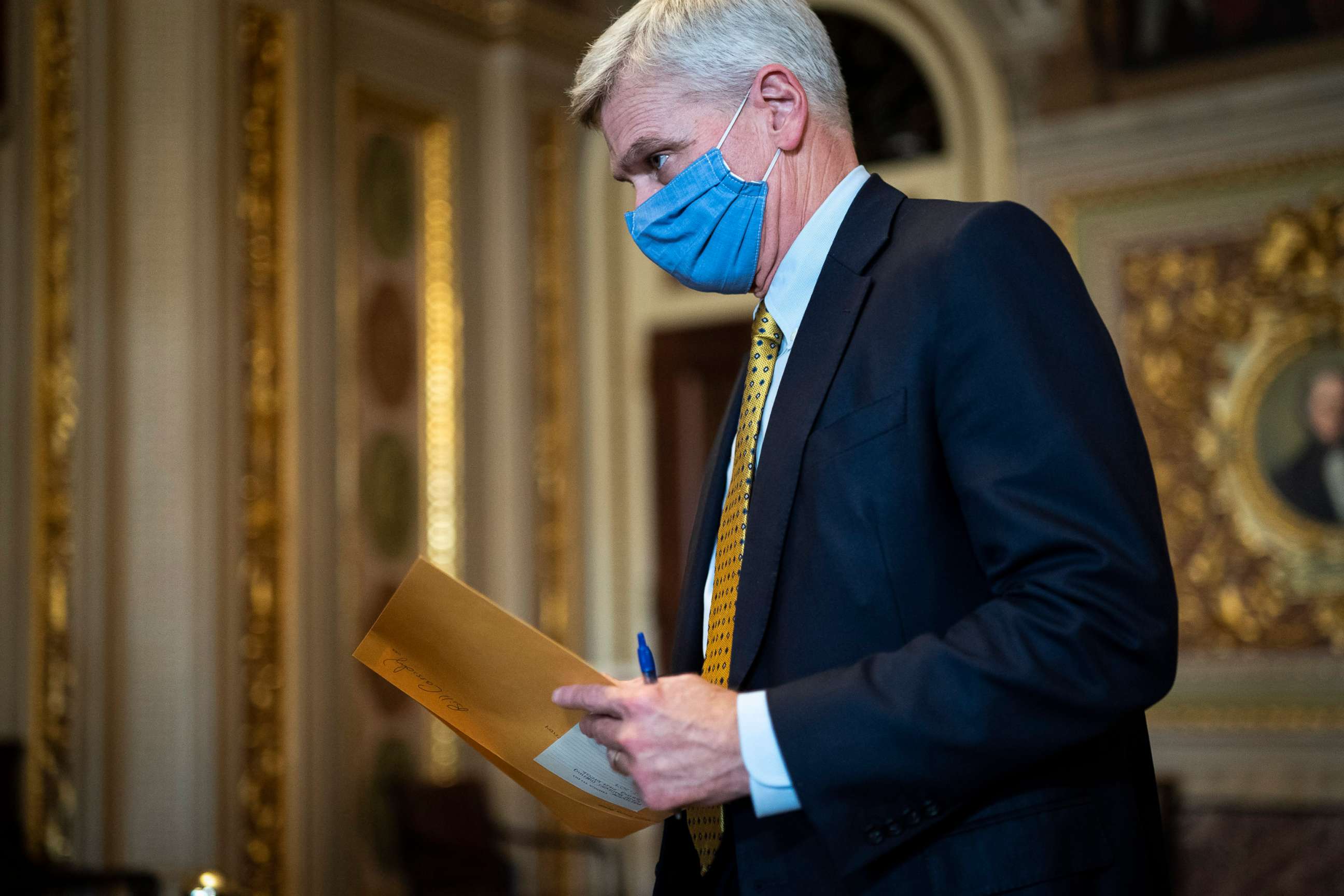
The Louisiana senator has said the question of what Trump knew on Jan. 6 as Pence was evacuated from the chamber is a key issue in his mind.
He asked Trump's lawyers about the president's call with Sen. Tommy Tuberville, R-Ala., that day -- before Pence was ushered out of the chamber -- and whether Trump knew that Pence was threatened and police officers were "overwhelmed." (Tuberville has told reporters that he informed Trump of Pence's flight from the Senate.)
Van der Veen dismissed Tuberville's recollection as "hearsay," and denied that Trump was dismissive of Pence's safety -- even though he attacked Pence on Twitter as rioters chanting "hang Mike Pence" mobbed the Capitol.
Cassidy appeared unsatisfied with van der Veen's response, and was seen pacing in the chamber during the trial.
Trump's lawyers won't say he lost election
In one of many combative moments during the question-and-answer portion of the trial, van der Veen bristled when Sen. Bernie Sanders, I-Vt., asked him Trump won the election -- challenging him to respond to Trump's baseless claims at the core of his effort to overturn the election.
"Who asked that?" he asked.
"I did," Sanders shouted back from his desk.
"My judgment is irrelevant in this proceeding," van der Veen replied, prompting Sanders to shout back, "You represent the president of the United States!"
Van der Veen did not answer the question in his response, repeating that the issue was "irrelevant" and again attempted to argue that the riot "didn't have anything to do with Mr. Trump in any way."
Trial on path to wrap over weekend
Trump's legal team used only 2 1/2 of the 16 hours allotted to them for arguments on Friday, allowing the Senate to take up senators' questions Friday afternoon.
After a contentious few hours, the Senate adjourned, teeing up a debate and vote over witnesses. But with Democrats and Republicans in agreement that witnesses aren't necessary for the trial, the Senate is on track to wrap up proceedings and hold a vote on whether to convict Trump over the weekend.
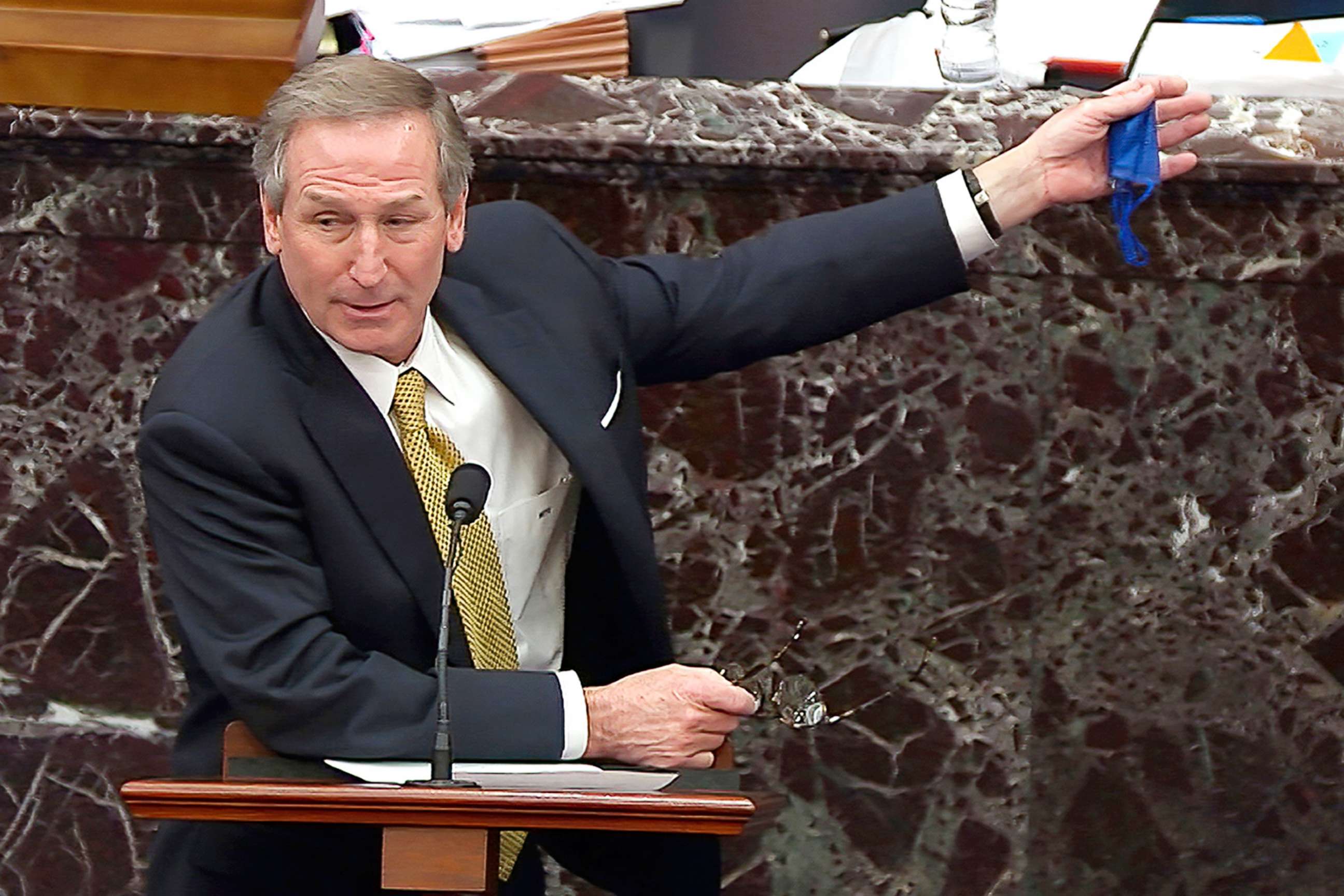
While some lawmakers floated a censure of Trump immediately following the Jan. 6 riot, most senators have refused to entertain the topic during the ongoing trial.
"I will have some things to say maybe next week, but not this week," House Speaker Nancy Pelosi said on Thursday, when asked about other possible ways of holding Trump accountable. "Let's just see what the case is and what their response is to it, but I'm not acting upon something that hasn't happened yet."
Senate votes to award officer Eugene Goodman the Congressional Gold Medal
The only bipartisan moment on the floor Friday came at the end of proceedings, when Senate Majority Leader Chuck Schumer received unanimous consent to pass a bill awarding Capitol Police Officer Eugene Goodman the Congressional Gold Medal -- the highest honor bestowed by Congress.
Goodman was praised after Jan. 6 for diverting rioters away from Pence and the Senate chamber. But managers also revealed during the trial that he helped direct Sen. Mitt Romney, R-Utah, to safety as the Capitol was breached.
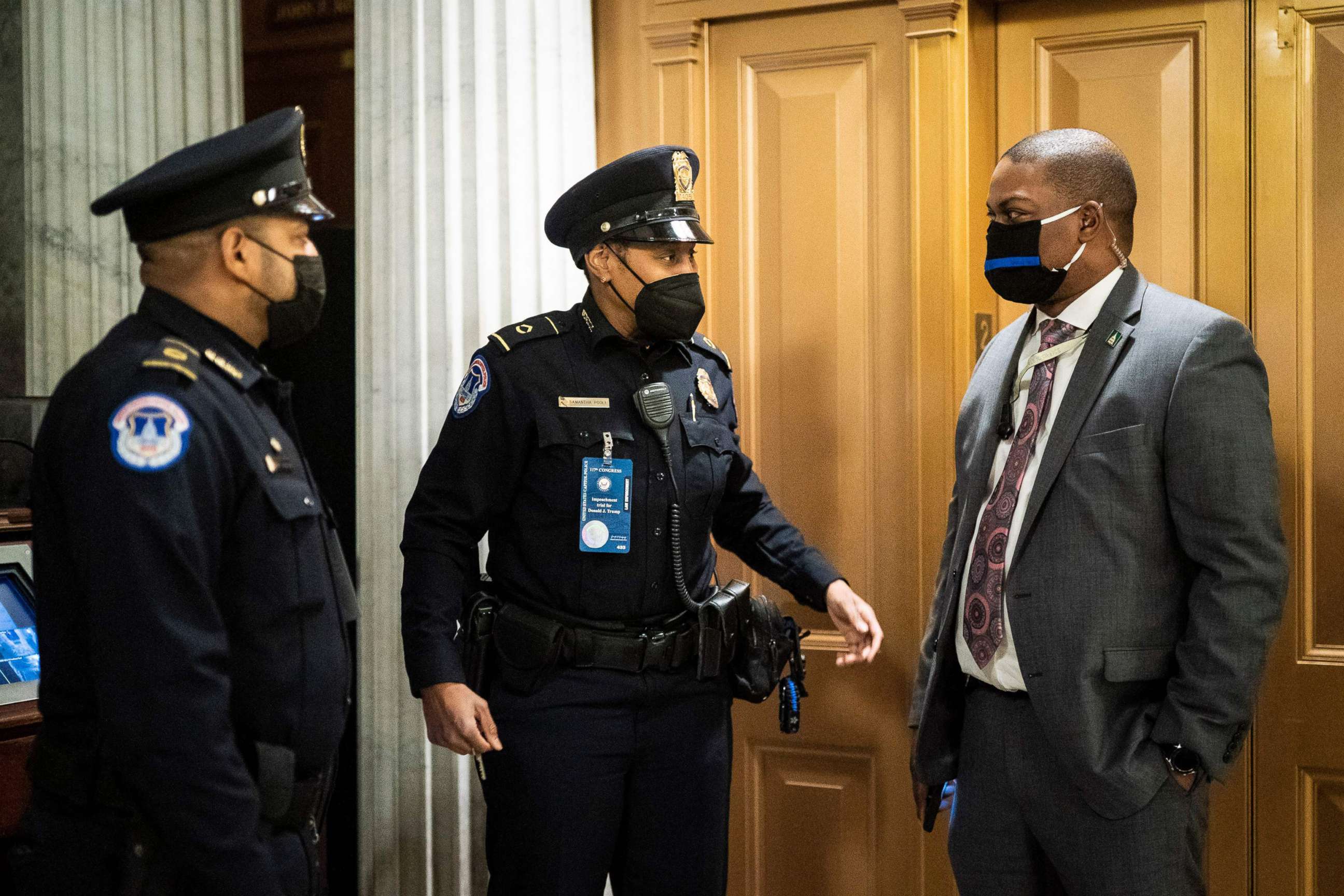
"The world learned about the incredible, incredible bravery of Officer Goodman on that fateful day," Schumer said.
Goodman was in the chamber as Schumer made the announcement, which prompted a standing ovation from the Senate, Trump's defense team and the House managers, as everyone turned and faced Goodman, who was positioned in the back of the chamber.
"In the face of lawlessness, the officers of the U.S. Capitol lived out the fullest sense of their oath," Senate Minority Leader Mitch McConnell, R-Ky., concurred.
It's not clear when the House will take up the measure. Pelosi has suggested awarding the entire Capitol Police force the Congressional Gold Medal as well.



